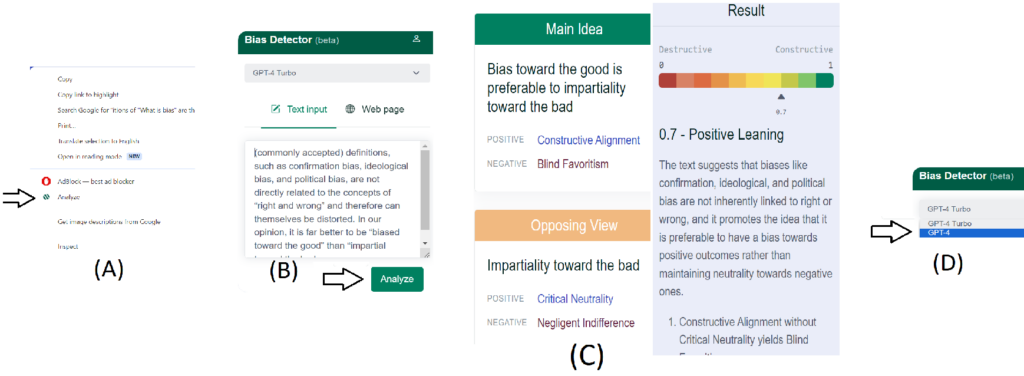Dialexity’s Bias Detector (downloadable here) assesses the extent to which text supports the positive aspects of opposing views while avoiding exaggeration. It is based on the dialectical principle that objective truth arises from the complementarity of opposing views, rather than from “material laws independent of our views.” For more on our philosophy, see below.

How it Works
First, it identifies the main thesis (T), its antithesis (A), and the positive (+) and negative (-) results of each (see USPTO Provisional Patent Application for more details). It then determines the Bias Score (BS) based on how well the user’s message supports the positive outcome, while avoiding the negative exaggerations:
- 0.0 – 0.2: The text might be misleading or overly negative.
- 0.3 – 0.4: There’s some positivity, but it’s overshadowed by negative views.
- 0.5: Neutral, suitable for factual content.
- 0.6 – 0.7: Positivity starts to outweigh negativity.
- 0.8 – 1.0: Highly constructive and balanced, focusing on positive outcomes.
How To Use
After installing the plugin, select any text on the screen, right-click and select ‘Analyze’ (from the A menu list):

This will open the plugin window (B) with pasted text that you selected. Click ‘Analyze’ and wait for the result (C). If the result is not accurate enough, then switch to the standard (not “turbo”) GTP 4.0 (D), which often works more accurately, but also slower.
Please also note that some texts may not be processed due to Openai’s content filter restrictions.
Disclaimer: All results provided by Dialexity are estimated by GPT-4.0 or GPT-4.0 Turbo and should be used for reference purposes only.
Philosophy
Our philosophy differs from conventional definitions of biases in that we measure “constructiveness,” that is, the ability to achieve complementarity, as opposed to “impartiality,” which can always be associated with either indifference or hypocrisy. Dialectical bias is directly related to what we consider right and wrong, constructive and destructive, while other biases are usually related to what is considered subjective and objective, partial and impartial. We argue that it is better to be “biased toward the constructive good” than “unbiased toward the destructive bad” – that’s why we started with assesing the ‘dialectical bias’. In future versions, more types of biases can be assessed:
List of Biases (wikipedia)
List of Cognitive Biases
Confirmation Bias
Ideological Bias
Political Bias
See also:
What types of biases should we tackle first? (blogpost)
Provisional Patent Application
The Dialectic Lie Detector

